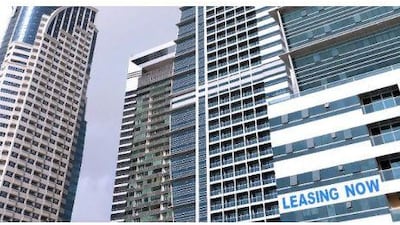After two years of searching for office space in Dubai, Standard Chartered last week announced plans to fund construction of a new headquarters in downtown Dubai.
Despite 40 per cent of office space in the city being empty, and with rents falling, the bank did not want space in any of the buildings with complex ownership schemes governed by Dubai's fledgling Strata Law.
"It is certainly the case that the amount of strata-titled buildings in the market limited the choices available to [Standard Chartered] with respect to existing buildings," said Nick Hughes, the bank's regional head of corporate property services.
Strata buildings have more than one owner, and the owners together are responsible for paying service charges and maintaining common areas. Strata is common in residential buildings but unusual in office markets, where most buildings have single owners. It is most often found in smaller, boutique commercial buildings.
The impact of the strata structure on office leasing in Dubai, however, is expected to increase dramatically in the next few years, as more buildings with multiple owners come on the market.
Forty-one per cent of the new office space scheduled for completion this year is strata titled, according to research by the property consultancy CB Richard Ellis (CBRE). That number jumps to 81 per cent next year and to 95 per cent in 2013, CBRE reports.
"It is having a very big impact," said Nicholas Maclean, the managing director of CBRE in the Middle East. CBRE's international clients typically "disregard strata buildings", Mr Maclean said. "Strata buildings are not even considered in many cases, regardless of the quality of the building."
In Dubai, however, many developers recruited multiple owners to help finance large projects and minimise their exposure during the building boom.
The structure adds elements of risk and complexities for occupiers. If owners do not pay service fees, buildings can deteriorate rapidly, leaving tenants in substandard accommodation, analysts say.
Regulations in Dubai governing strata building are still in their early stages. The industry is still awaiting more details on how tenants and owners will be protected, analysts say. "There needs to be real focus on insuring that if a building is stratified, that the owners are paying their maintenance fees," said Blair Hagkull, the head of the Middle East office for the property consultancy Jones Lang LaSalle (JLL). "That has to be on top of everybody's agenda."
The difficulty leasing strata buildings is one of the reasons average lease rates in Dubai are continuing to decline. Rents in the city fell 30 per cent, to Dh150 (US$40.84) a square foot, from December 2009 to last December, according to JLL research.
The office vacancy rate is expected to jump from 41 per cent to 45 per cent in the next year, as more buildings are completed, JLL says.
Many strata buildings are occupied by investors and offer only small pockets of space to investors. But others may face problems attracting tenants, analysts say.
"Standard Chartered is unique, but we expect to see more transactions like that," Mr Maclean said.
The bank is committing $140 million towards construction of the building in Dubai, which will be built by Gulf Resources Development and Investment. The bank will lease eight of the 13 office floors in the building for 15 years.
The bank plans to move 1,250 employees from its Bur Dubai local headquarters; it will keep a regional headquarters in the Dubai International Financial Centre.
The bank will have naming rights and the ability to expand easily, the type of considerations the company was unlikely to find in a strata building. "Any type of sophisticated investor is going to look for something they can control," Mr Hagkull said.
Some owners of strata buildings may eventually look to convert their buildings to residences, but it is usually difficult to reschedule electrical and water systems from office to residential use.
"In the long run, the only solution will be either consolidation or destratification," Mr Hagkull said.

